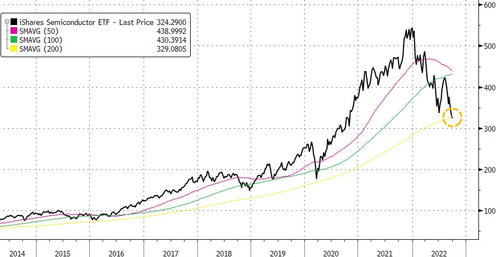“Full-Fledged Ice Age”: Semiconductor Companies Slash Output On Supply Glut
Samsung Electronics, the world’s largest memory chipmaker, provided more insight into the worsening slowdown for semiconductors and the bust in global PC markets.
Korea Economic Daily reported Samsung “lowered its semiconductor sales forecast for the second half of the year by more than 30%.” The newspaper attributed slumping semiconductors demand “as the economy froze due to central bank rate hikes caused by global inflation.”
The paper warned: “As the semiconductor industry has entered a full-fledged ice age, there are many forecasts in the industry that the recession will continue until the first half of next year when semiconductor inventories are eliminated.”
Earlier this week, Samsung’s Device Solutions division said they “lowered our sales guidance for the second half of this year (the company’s internal forecast) by 32% from our April forecast.”
None of this should be a surprise as we recently outlined PC Demand Suffers’ Steepest Decline In Years’ As Chip Shortage Turns To Glut.
“Both DRAM and NAND flash suppliers and customers are holding too many semiconductor inventories,” an official told Korea Economic Daily.
Another top semiconductor company, Japan’s Kioxia Holdings Corp, announced it would slash wafer production starts by 30% next month, according to Bloomberg.
“The deep cuts stem from weakening demand for computers and smartphones, and the wider semiconductor industry is likely to follow the trend.
“Hard times are ahead for the industry, except for a few,” said Kazunori Ito, an analyst with Morningstar.
These souring developments in the global semiconductor market come as the largest US manufacturer of memory chips, Micron, reported revenue that missed (despite a slight beat on EPS and margins), but it was the forecast that again was a total disaster.
Micron offered one of the most significant recession warnings so far from a large corporation: “results were impacted by rapidly weakening consumer demand and significant customer inventory adjustments across all end markets.” It added that due to the sharp decline in near-term demand, it expects “supply growth to be above demand growth in calendar 2022.”
“Yes, we have a challenging market environment, but we’re responding rapidly with actions … fiscal 2023 is, of course, an unprecedented environment, but the long-term drivers are intact,” Micron CEO Sanjay Mehrotra said in an interview.
But it’s just not memory chips. We pointed prices of graphics processing units (GPUs) have plunged to their lowest levels ever in China, and chip deflation was already washing ashore in the US.
The iShares Semiconductor ETF (SOXX) has fallen 40% since peaking in late 2021, and the weekly 200-day moving average is being tested.
Earlier this week, Bloomberg reported Apple ditched plans to increase iPhone production due to a lack of demand. Weeks ago, FedEx warned that the global economy is “going into a worldwide recession.”
If both the semi-industry and top shippers are warning about economic turmoil ahead, then it’s probably time to start preparing for a possible recession in 2023. Meanwhile, the Federal Reserve continues to hike into a slowdown aggressively — this is a recipe for an epic policy error.
On the bright side, now, or at least in the months ahead, it might make sense to build a computer as it seems components, such as memory chips, GPUs, and CPUs, could be heavily discounted.
Tyler Durden
Fri, 09/30/2022 – 18:40
via ZeroHedge News https://ift.tt/N9Qhw4k Tyler Durden
